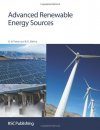About this book
Advanced Renewable Energy Sources is an ideal reference text for teaching renewable energy to engineering and science students, as well as a reference book for scientists and professionals doing self study on the subject. Advanced Renewable Energy Sources has twelve chapters and starts with the definition and classification of renewable and non renewable energy and their status at global level. This chapter also contains the basic heat transfer mechanisms and laws of thermodynamics. It then deals with availability of solar radiation at different latitudes and energy and exergy analysis of flat plate collector, solar air collector, solar concentrator, evacuated tube collector, solar water heating system, solar distillation and solar cooker. The following chapter discusses the basics of semiconductor, its characteristics, working, characteristics of solar cell in dark and daylight situation, fundamentals of characteristic curves of semiconductor, fundamentals of PV module and array and some PVT systems. Detailed discussion on biomass, bio-fuels and biogas and their applications and the power produced by them, namely bio-power, is covered in the following chapters.
Other renewable energy sources like hydropower, wind and geothermal are then covered as well as a chapter dealing with the working principle, basic theory and the capability to produce power from ocean thermal, tidal, wave and animal energy conversion systems. Subsequently, net CO2 mitigation, carbon credit, climate change and environmental impacts of all renewable energy resources are all covered followed by a discussion on the techno-economic feasibility of any energy sources as the backbone of its success and hence energy and economic analysis. The chapters deal the overall exergy of renewable energy sources by using the thermal and mechanical power and electrical energy as output. SI units are used throughout Advanced Renewable Energy Sources in solving various exercises in each chapter and conversion units of various physical and chemical parameters of metals and non-metals are also given in appendices.
Contents
- General Introduction
- Solar Energy
- Photovoltaic and Photovoltaic Thermal Systems
- Biofuels Biopower
- Hydropower
- Wind Energy
- Geothermal Energy
- Ocean Thermal, Tidal, Wave and Animal Energy
- Sustainable Environment
- Energy and Exergy Analysis
- Economics of Renewable Energy
- Appendix
- Glossary
- Subject Index
Customer Reviews
Biography
Professor Gopal Nath Tiwari is at the Centre for Energy Studies, Indian Institute of Technology, New Delhi, India. He received his postgraduate and doctoral degrees from Banaras Hindu University (BHU). Since 1977 he has been actively involved in teaching and research at the Centre for Energy Studies, Indian Institute of Technology. His areas of research include solar distillation, the water/air heating system, greenhouse technology, earth-air heat exchangers, passive building design and hybrid PV thermal (HPVT) systems. He has supervised 60 PhD students and published over 450 research papers in well-known refereed journals and has written 20 books in association with respected publishers. He was co-recipient of the Hariom Ashram Prerit SS Bhatnagar Award in 1982. Dr Tiwari worked at the University of Papua New Guinea between 1987 and 1989 as Energy and Environment Expert and became a European Fellow at the University of Ulster, Belfast, Northern Ireland in 1993. He is responsible for developing the Solar Energy Park at IIT Delhi and the Energy Laboratory at the University of Papua New Guinea. He has been invited to speak in many countries including Italy, Canada, USA, UK, Australia, Greece, Thailand, Singapore and Taiwan and he has chaired international conferences as an expert in renewable energy, presenting research papers. He was awarded with the "Solar Energy Valued Associate Editor" by the Publisher, Elsevier, in 2008 for his exceptional contribution to the quality of solar energy and was editor of the International Journal of Agricultural Engineering for three years. He is also an active member of the editorial advisory boards for more than a dozen journals which include Solar Energy, International Journal of Photoenergy, International Journal of Energy Research, The Open Environmental Sciences, The Open Renewable Energy Journal and Open Fuels & Energy Science Journal.
Rajeev Kumar Mishra is at the Centre for Energy Studies, Indian Institute of Technology, New Delhi, India. He received his BSc in Mathematics, Physics and Chemistry from the University of Allahabad, India in 2003 and an MSc in Physics from the University of Allahabad in 2005. He received his Master of Technology degree in Material Science and Technology from the Institute of Technology, Banaras Hindu University (BHU) in 2008. Presently, he is pursuing a PhD under the supervision of Professor Tiwari and he has submitted a review paper on photovoltaic modules and their application in applied energy. His areas of research interest are solar thermal, photovoltaics, heat and mass transfer, exergy, CO2 mitigation, climate change and carbon trading.


































